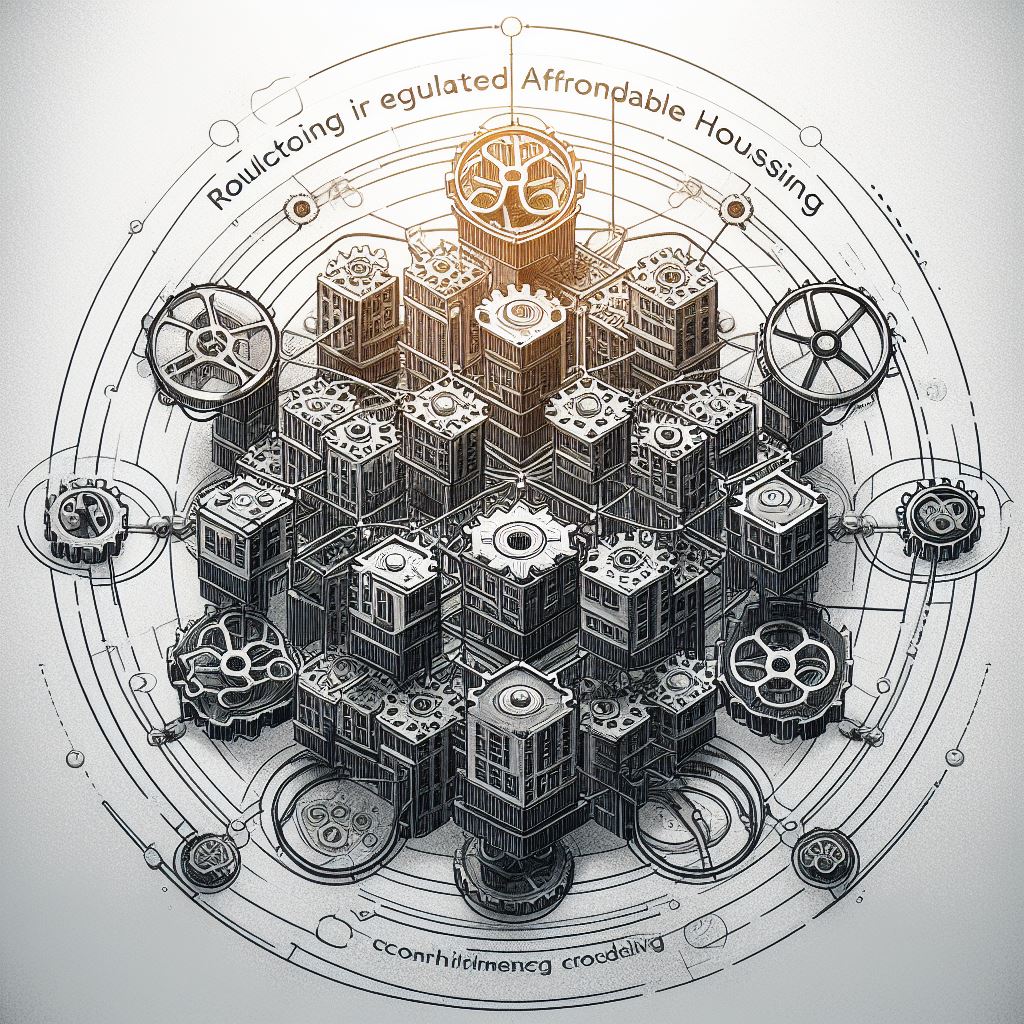Decoding Agency Roles in Regulated Affordable Housing

Are you ready to unravel the intricate web of agency roles in regulated affordable housing? Look no further.
This article aims to decode these roles, shedding light on the responsibilities of entities such as HUD, local housing authorities, state housing finance agencies, the IRS, and nonprofit organizations.
Using an analytical and evidence-based approach, we will explore how these agencies impact the availability and affordability of housing, providing you with a comprehensive understanding of the complex landscape of affordable housing regulations.
Key Takeaways
- HUD is responsible for setting standards and regulations for the quality and safety of affordable housing.
- Local housing authorities actively participate in community development efforts and collaborate with other agencies.
- The State Housing Finance Agency ensures compliance with regulations and guidelines for affordable housing projects.
- Nonprofits play a key role in developing affordable housing units, securing funding from various sources, and providing services to residents.
The Role of HUD
Understanding HUD’s role in regulated affordable housing is crucial for navigating the complexities of the housing market. The U.S. Department of Housing and Urban Development (HUD) plays a significant role in ensuring access to safe and affordable housing for low-income individuals and families. Established in 1965, HUD’s mission is to create strong, sustainable, inclusive communities and quality affordable homes for all.
One of HUD’s primary responsibilities is to administer the various affordable housing programs, such as the Housing Choice Voucher Program (Section 8) and the Low-Income Housing Tax Credit (LIHTC) Program. These programs provide rental assistance and incentives to developers, respectively, to increase the availability of affordable housing units. HUD also sets standards and regulations to ensure that affordable housing meets certain quality and safety standards.
Moreover, HUD works to enforce fair housing laws and combat housing discrimination. They investigate complaints, provide education and resources, and promote equal access to housing opportunities for all individuals, regardless of race, color, religion, sex, familial status, disability, or national origin. Through these efforts, HUD aims to create inclusive communities and reduce disparities in housing access and opportunities.
The Responsibilities of Local Housing Authorities
To understand the responsibilities of local housing authorities in regulated affordable housing, you must be aware of their essential role in ensuring access to safe and affordable housing for low-income individuals and families. Local housing authorities play a crucial part in implementing and managing affordable housing programs in their respective communities.
Here are three key responsibilities that local housing authorities undertake:
- Administering housing assistance programs: Local housing authorities are responsible for managing programs such as the Housing Choice Voucher Program (Section 8) and public housing. They determine eligibility, process applications, and allocate housing resources to eligible individuals and families.
- Property management: Local housing authorities oversee the maintenance and management of affordable housing properties. This includes ensuring that the properties are safe, habitable, and in compliance with housing regulations. They also coordinate repairs, handle tenant concerns, and enforce lease agreements.
- Community development: Local housing authorities actively participate in community development efforts. They collaborate with other agencies, nonprofits, and developers to identify housing needs, develop affordable housing plans, and implement strategies to revitalize neighborhoods. Additionally, they engage in public outreach and education to promote awareness and understanding of affordable housing programs.
Understanding the State Housing Finance Agency
Local housing authorities play a crucial role in regulated affordable housing, but it’s also important to understand the role of the State Housing Finance Agency in ensuring access to safe and affordable housing for low-income individuals and families.
The State Housing Finance Agency (SHFA) is a government entity that works closely with local housing authorities, developers, and other stakeholders to provide financial resources and support for affordable housing initiatives.
One of the primary responsibilities of the SHFA is to allocate funding for affordable housing programs. They receive funds from various sources, including federal grants, bond issuances, and state budget allocations. These funds are then distributed to local housing authorities and developers through a competitive application process. The SHFA carefully evaluates the proposals and selects projects that align with their mission of providing safe and affordable housing options.
In addition to funding, the SHFA also plays a crucial role in ensuring compliance with regulations and guidelines. They establish and enforce standards for the construction, management, and operation of affordable housing properties. This includes conducting regular inspections to ensure that the properties meet the required standards and providing technical assistance to address any issues that may arise.
Furthermore, the SHFA works to promote partnerships and collaborations among various stakeholders in the affordable housing sector. They facilitate the coordination between local housing authorities, developers, non-profit organizations, and financial institutions to maximize the impact of affordable housing initiatives. By fostering these partnerships, the SHFA aims to leverage resources and expertise to create sustainable and inclusive communities.
The Impact of the IRS in Affordable Housing
You play a crucial role in regulated affordable housing through your understanding of the impact of the IRS. The IRS, or Internal Revenue Service, has a significant influence on the development and operation of affordable housing projects. Here are three ways in which the IRS impacts affordable housing:
- Allocation of Low-Income Housing Tax Credits: The IRS administers the Low-Income Housing Tax Credit (LIHTC) program, which is the primary source of funding for affordable housing projects. Through this program, the IRS allocates tax credits to state housing agencies based on a formula. These credits are then sold to investors, who provide equity for the development of affordable housing.
- Compliance Monitoring and Reporting: The IRS enforces compliance with the LIHTC program’s rules and regulations. They require developers and owners of affordable housing projects to submit regular reports, including tenant income certifications and rent calculations. The IRS also conducts audits and inspections to ensure that the projects continue to meet the program’s requirements.
- Recapture of Tax Credits: The IRS has the authority to recapture tax credits if a project fails to comply with the LIHTC program’s rules. This can happen if the project doesn’t maintain the required number of affordable units or fails to meet the income restrictions. Recapture can have significant financial consequences for developers and owners.
Understanding the impact of the IRS is vital for anyone involved in regulated affordable housing, as it ensures compliance with the LIHTC program’s requirements and helps support the development and maintenance of affordable housing projects.
The Role of Nonprofit Organizations
Nonprofit organizations play a crucial role in supporting and advancing affordable housing initiatives. These organizations, which are driven by a mission to serve the community rather than make a profit, bring unique resources and expertise to the table. They often act as intermediaries between government entities, developers, and residents, working to ensure that affordable housing projects are successful and sustainable.
One key aspect of the nonprofit role in affordable housing is their ability to access and leverage funding sources that may not be available to other entities. Nonprofits can apply for grants and secure donations from foundations, corporations, and individuals who are passionate about affordable housing. This additional funding allows them to supplement government subsidies and invest in the development and preservation of affordable housing units.
Nonprofits also provide crucial services to residents of affordable housing. They offer support and resources that help individuals and families thrive in their homes. These services can include financial education, employment assistance, and access to healthcare and social services. By addressing the needs of residents beyond just providing affordable housing, nonprofits contribute to the long-term success of these communities.
Furthermore, nonprofits often play a role in advocating for policies and regulations that support affordable housing. They engage in community organizing, education, and outreach efforts to raise awareness about the importance of affordable housing and push for change at the local, state, and federal levels.
Frequently Asked Questions
How Do Local Housing Authorities Determine Eligibility for Affordable Housing Programs?
Local housing authorities determine eligibility for affordable housing programs based on factors such as income, household size, and residency status. They use application processes, income verification, and documentation to assess eligibility and ensure fairness in program distribution.
What Is the Process for Obtaining Funding From the State Housing Finance Agency for Affordable Housing Projects?
To obtain funding from the state housing finance agency for affordable housing projects, you need to research the specific requirements and application process. It’s crucial to provide a compelling proposal with clear goals and a solid financial plan.
How Does the IRS Monitor Compliance With Affordable Housing Regulations?
The IRS monitors compliance with affordable housing regulations by conducting audits, reviewing documentation, and implementing penalties for non-compliance. They ensure that developers and owners follow the guidelines to maintain the affordability of housing units.
What Are the Primary Sources of Funding for Nonprofit Organizations Involved in Affordable Housing?
The primary sources of funding for nonprofit organizations involved in affordable housing include government grants, private donations, low-income housing tax credits, and partnerships with banks and foundations. These funds are crucial for supporting the development and maintenance of affordable housing projects.
What Are the Key Challenges Faced by Nonprofit Organizations in Providing Affordable Housing?
You face key challenges in providing affordable housing. For example, limited funding and complex regulations make it difficult to meet demand. However, with strategic partnerships and innovative solutions, you can overcome these obstacles and make a meaningful impact.



